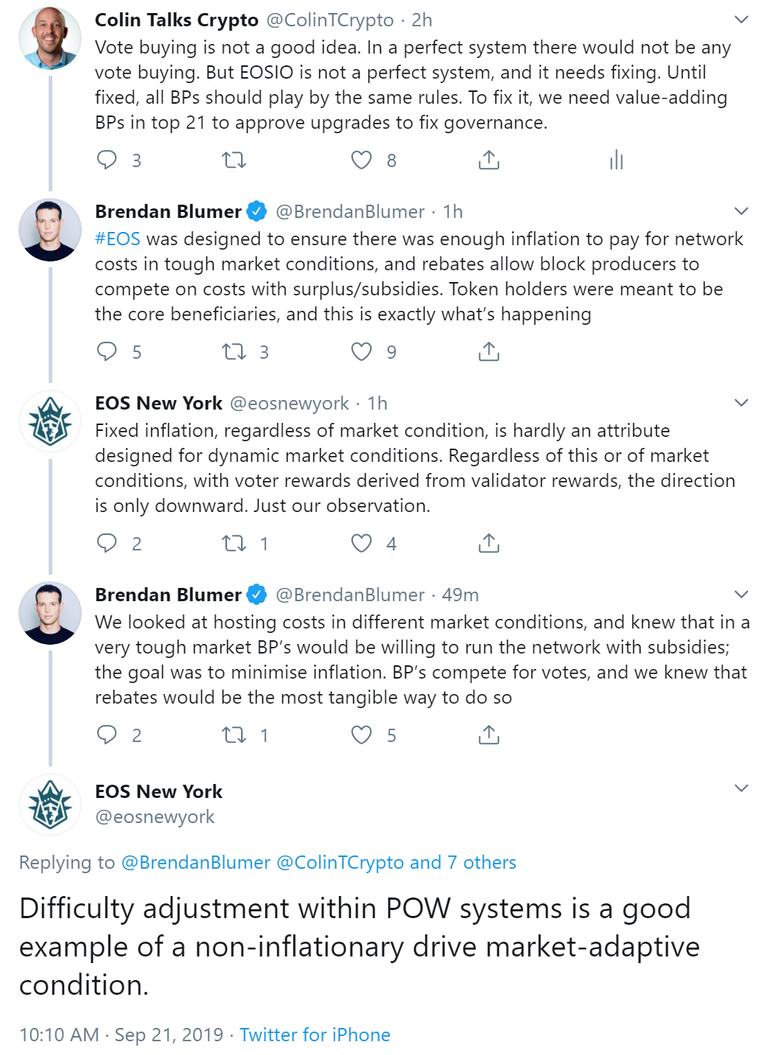
Per recent discussion with Brendan Blumer, CEO of block.one, there are 2 main objectives attempting to be solved right now with EOS governance:
BP pay variability in tough market conditions.
Rewarding voters for their time and effort, to increase voter turnout and participation, while minimizing inflation.
I will add a third main objective:
3. Quality BPs who have the long-term best interest for EOS in mind (not just short term, bare-minimum, profit-leeching) and who are geographically distributed.
The current solutions being used to solve either of the first two goals is currently having a negative effect on the other goals.
For example, in an effort to solve the BP pay variability (point #1), we are sacrificing BP quality (point #3) for the purpose of having an "excess BP pay competition" in the form of voter rewards (point #2).
But by having voter rewards (point #2), we are encouraging "voter reward" OVER "BP substance" (quality of BP) (this affects point #3).
This system siphons value from true, value-creating BPs (point #3) in effort to solve the first two problems (point #1 and #2).
As Brendan has pointed out, it is ultimately token holders who pick which BPs are in the top ranks (This happens in one of many ways: by keeping tokens on an exchange and having that exchange vote as one's "proxy", by voting directly for a proxy, or by voting directly for BPs), but with the incentives misaligned, it causes a misalignment of the best, value-adding BPs for the ecosystem.
Rather than a Rube Goldberg system with one facet of the system attempting to resolve other facets, which then results in undesired side-effects, we should address each facet directly, as much as possible, and attempt to isolate the problems so that our solutions are precision laser-targeted.
Solutions to each point above:
Block producer operating bills are largely in fiat. Therefore it makes sense to pay BPs in relation to fiat rather than by fixed inflation as is currently done on EOS. As the price of the EOS token changes, BP pay can be scaled flexibly in "tough" (volatile) market conditions by a introducing variable reward system (One idea could be pegging BP pay amount to the average price of a basket of fiat currencies [for diversity and shock resistance] and scaling pay accordingly as the price of the EOS token changes). This is analogous to how POW systems auto-regulate difficulty, as EOS New York mentioned in the image above.
Create a separate voter reward fund so it's not tied in with BP pay. Using excess BP pay to reward voters skews the system into valuing REWARD over SUBSTANCE (quality of BP). (There is no desire to add inflation, and a separate fund would increase inflation, so ideas are invited on how to accomplish this without introducing inflation, or at least minimizing it). It is worth noting that EOS was originally designed with 5% total inflation (with 4% going toward a "worker proposal fund" which has remained unused to this day, and 1% going toward BP pay). So the goal of minimizing inflation can still be realized within the original intentions by reducing the worker proposal fund and also rewarding voters.
"1 token 1 vote", for fairer voting and less collusion among BPs. Other options such as "1 token, 1 vote squared" could be considered as well, if after further testing they are proven superior and un-gameable.
Driving value on EOS means high-quality, long-term-thinking BPs who enact upgrades on EOS that are for the best interest of the network, and who are forward-thinking and not just caught up in day-to-day vote buying.
By making it so the lowest value BPs have the greatest chance at top ranks, this could have a dilution effect on EOS price in the long-term as it encourages voter reward over long-term BP substance (quality).
What happened with Dan Larimer’s amazing Solution to EOS Vote Buying to "Pay People Not To Vote"?:
Why no one is considering this proposal from the inventor of eos.io as solution for this problem?
Maybe it's better to not touch the REX and pay the additional and higher inflation for those who not vote or doing something like a "null" vote. https://www.eoswriter.io/4276_did-dan-larimer-just-solve-vote-buying-on-eos.eos
It's an interesting concept for sure. I think it should be tested and see if its workable.